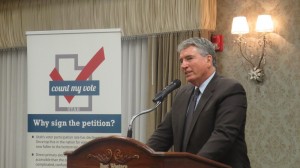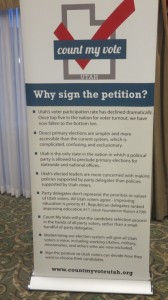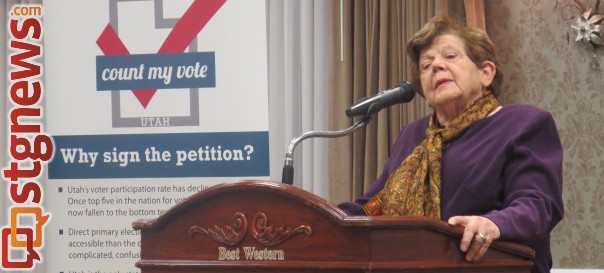
ST. GEORGE – Former Utah Gov. Olene Walker and Utah House Speaker David Clark spoke in support of the Count My Vote ballot initiative Monday night, addressing a mixed crowd of supporters and opponents.
Held at the Best Western Abbey Inn, some people simply arrived to sign the petition and then leave, while others came to learn more about the ballot initiative and hear what Walker and Clark had to say. Others, still, made their opposition known.
Henrie Waltin, a representative of Count My Vote, said the petition to get the initiative on the ballot for November is going very well, and that it already has tens of thousands of signatures across the state and thousands in Washington County. The initiative needs 140,000 signatures by April 15 to be put on the November ballot.
Supporters – “Trust the voters”
The initiative, if put on the ballot and passed, will replace Utah’s current caucus-convention system with a direct primary. Supporters claim the current system is out of date, excludes part of the voter base, and leaves the choice of election candidates in the hands of a select few – namely the caucus delegates.

By getting rid of the state’s caucus convention system, the initiative’s supporters argue, it allows more people to be involved in the candidate selection process and will encourage greater voter participation.
“I have watched for many years and have been concerned about our elections,” Walker said.
The people of Utah have become lax in their participation in the voting process, Walker said, noting that many caucus meetings she has attended over the years have not always been well attended.
The people don’t feel they are a part of the system because they have given their power to the caucus delegates, Walker said. Individuals need to study the candidates and issues more, and not surrender that responsibility to the delegates, she said.
Clark kept his comments brief; he said he believes there needs to be policy changes and that Count My Vote is a good start. He also said the voters as a whole aren’t trusted enough.
“I would encourage you to simply trust the voters,” Clark said.
While delegates have helped vet the candidates in the past, the voters are able to become just as informed on the candidates and the issues thanks to Internet, he said.
Both emphasized the petition is just to get the initiative on the November ballot so it can be voted up or down.
Opposition – “access to candidates”
Two groups, “Protect Our Neighbor Elections” and “Keep Our Caucus,” have sprung up in opposition to Count My Vote. They both claim that replacing the caucus system will remove the public’s access to the candidates, particularly well-established ones.
“I never have to vote for anyone I don’t know,” said Tamara Atkin, of Keep Our Caucus. Visiting from Utah County, she and others dropped in on the event to speak for the opposition. Originally from California, she said she wondered why people in Utah wanted to model their election process after that state.
At least in Utah, anyone from candidates to governor to powerful senators seeking re-election have to abide by the will of neighborhood caucus delegates. In California, Atkin said the closest many voters got to the candidates were campaign ads.
“In California, you never meet the candidates,” Atkin said. “I don’t know why we want to emulate California.”

Delegates versus voters
In the current system, candidates are vetted by delegates chosen by neighborhood caucuses across the state. Anyone from first-time politicians to seasoned officials with national name recognition go through the same vetting process. The candidates are ultimately voted on at state party conventions. If a single candidate receives over 60 percent of the vote, that candidate gets the party nomination and goes on to the general election. If no one gets that majority, however, than a primary is held.
“We have a lot of hard-fought primaries,” Dixie Republican Forum president, Larry Meyers, said.
Count My Vote argues some delegates don’t always reflect the values of the voters, but may follow personal or party agendas in candidate selection. Remove the caucus-convention system and it will encourage voters to learn about the candidates, rather than leaving it in the hands of the few who may not have voter interests at heart.
Caucus supporters claim the delegates keep the candidates accountable to the people. Take out the delegates with a direct primary and the election goes to whoever has the most money, they argue.
The elections will go to the candidate who is the best funded, best connected, and has the best hair, Atkin said. Regular folks won’t stand a chance, she said.
How a person becomes a candidate could change
Currently, all a person has to do is declare their candidacy for a particular position and pay a fee to have that declaration filed with the state. After that point, they have a campaign and delegates to deal with.
Count My Vote proposes to change that system and create what Waltin described as a potential barrier against less-serious candidates. If passed, prospective candidates will be required to get the signatures of 2 percent of the registered party voters in the jurisdiction in which they are running.
For example: In a jurisdiction where there are 1,000 registered Democrat voters, the candidate will need to gather 20 signatures to be put on the ballot leading to the primaries.
Opponents of Count My Vote claim this new process may eliminate regular individuals who are qualified to run, but may not be able to get the needed signatures. In much larger jurisdictions, a potential candidate may not have the funds needed to pay for people to go door-to-door for them in order to get those signatures.
Primaries in general can be very expensive affairs for candidates. Meyers, who has been a candidate for public office in the past, previously said he spent at least five times as much money during the primary phase of those campaigns, and significantly less otherwise.
Candidates who lack deep pockets may be discouraged from running due to the costs, Count My Vote opponents claim.
“It’s a very serious commitment,” Clark said.
When he ran for the state legislature in 2000, Clark said he knocked on 3,800 doors and spent around $30,000 on his campaign. If a candidate-hopeful can’t go out and pound the streets for a few hundred signatures, or even many times more than that, just how serious about running for public office is he or she in the first place?
New signing locations
Waltin announced that two new petition signing locations had been opened in St. George at the Hurst General Store, 160 North Bluff St., and the Hilltop Conoco gas station, 995 East St. George Boulevard.
Two other signing stations are open on the weekends at the Megaplex Theaters at 1091 North Bluff St. (Sunset Corner) and 2376 Red Cliffs Drive.
Resources
- County my Vote – Website
- Neighborhood Elections – Website
- Keep our Caucus – Website | Facebook page
Related posts
- My Vote hits St. George with supporters, opponents
- Hurricane City Council supports state caucus system
- Perspectives: Bamboozling us out of the caucus system
- The WAY I see it: Utah politics are the new ‘Chicago politics’
- Wright Leaning: Saving Utah’s caucus system
- Power of the people in the power of the caucus
(Ed. note: Correction 12:45 p.m. 20 signatures not 200 in the example given for 2 percent of registered party vote.)
Email: [email protected]
Twitter: @MoriKessler
Copyright St. George News, SaintGeorgeUtah.com LLC, 2014, all rights reserved.

A few signatures?
2% of state wide GOP would be 13,170 signatures. 2% of the state wide Democratic party would be 2,815 signatures to be a nominee for the primary.
I am sorry, but knocking on enough doors to get 13,170 will turn away most candidates for statewide office.
Also it is very hard to fund raise if you are not the party nominee or an incumbent. That leaves the rich, famous or incumbents to run. Do we really want to do that?
There are 2 options:
1) With caucuses the candidate has to organize people to get the signatures from the citizenry
2) With “count my vote” they would only have to write a check to an ad agency.
I’ll stick with the caucus system, thank you very much. All of the people behind “count my vote” (a total lie of a name, just like progressives always use) are either entrenched political insiders, or rich power brokers. “count my influence peddling” would be a better name.
Extreme? There are differences between polls between delegates and non delegates. Sometimes it is because the delegates have taken the time to meet the official or candidate personally or have asked a typical question. For example according to a Dan Jones Poll leaked this week, current Utah State Delegates have a higher opinion of Gov. Herbert than the average Republican voters. Is that extreme? For 2012 they picked Gov. Herbert over Morgan Philpot, Mia Love over Carl Wimmer and almost picked Orrin Hatch over Dan Liljenquest as the nominee. States with direct primaries actually have had more problems with extreme candidates.
When Utah tried a direct primary in 1937 to 1947, it came with a run off primary, so the majority would elect the nominee. When the voting turn out and the cost drove the public and the media to reject that system – a compromise, caucus/convention and run off primary was created. We have that today. Count My Vote not only removes the nominating for general elections using delegates, it removes the run off primary system we have and nominees will no longer be selected out of a 2 person race.
” If passed, prospective candidates will be required to get the signatures of 2 percent of the registered party voters in the jurisdiction in which they are running.
For example: In a jurisdiction where there are 1,000 registered Democrat voters, the candidate will need to gather 200 signatures to be put on the ballot leading to the primaries.”
Check your math, 2% of 1000 is 20
Math or typo, we got it corrected, thank you Daniel.
ST. GEORGE NEWS | STGnews.com
Joyce Kuzmanic
Editor in Chief
“Clark said he knocked on 3,800 doors and spent around $30,000 on his campaign. If a candidate-hopeful can’t go out and pound the streets for a few hundred signatures, or even many times more than that, just how serious about running for public office is he or she in the first place?”
Clark is a disgusting elitist, the best candidates dont have the most money, nor the most time to do all of that. The best candidates are every day hard working people who can be just as “serious” or “committed” to serving the public in elected office. That comment shows his true nature, and the true nature of the people trying to pass this agenda and do away with the caucus system. They are elitist who dont want their monopoly on power over the masses to be usurped.
The caucus system holds the candidates more accountable to the voters and eliminating the caucus system will only benefit the established party candidates. They know this; that’s why they want it eliminated. They claim that people will be able to research, vet, and form their own opinions. While that is true most do not and most will not. Thus the voting goes to the lowest information voter. The caucus system forces some to become knowledgeable about the candidates. Is it the best? Maybe not BUT given the voter apathy and ignorance so prevalent today it is the best we can hope for until voters become informed and involved as their great grandparents were 100 years ago.